When it comes to sought-after flooring options, vinyl undoubtedly takes the lead. Its versatility and durability make it an excellent choice for various spaces, including kitchens, bedrooms, and even bathrooms.
The appeal of vinyl flooring lies in its smooth texture and wide array of patterns, captivating the interest of homeowners seeking a stylish and practical flooring solution.
One of the remarkable features of vinyl is its versatility, as it can withstand moisture and high foot traffic, making it suitable for diverse rooms in your home.
Furthermore, vinyl flooring boasts impressive durability and is remarkably easy to clean. It requires no special treatments and can maintain its quality for up to 20 years—truly a long-term investment.
Now, if you’re considering installing vinyl flooring for your business, it’s essential to note that there are different types available. Vinyl is typically made with PVC materials and compressed plywoods, resulting in a sturdy composition.
The top layer of vinyl flooring usually features a printed photograph covered with a protective plastic coating, giving it a realistic appearance.
Before making an investment in vinyl floors, it’s wise to explore the various types of vinyl flooring options available. So, let’s delve into the details and discover the perfect vinyl flooring for your needs.
Vinyl Plank
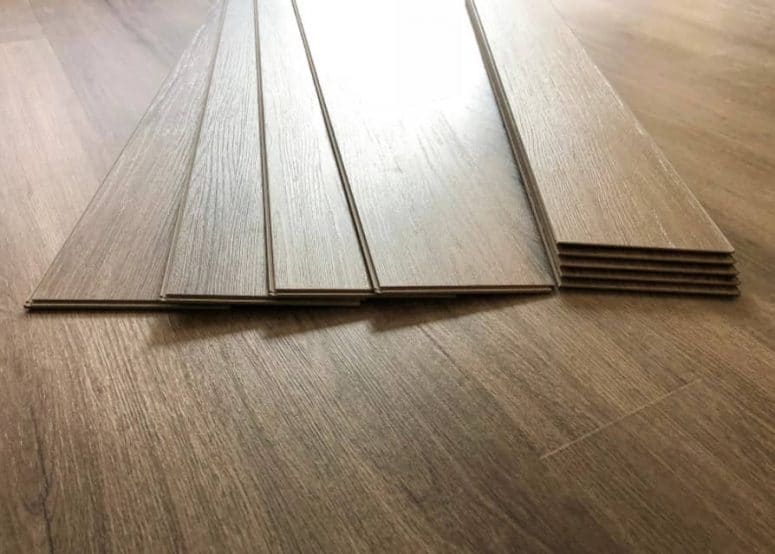
Plank vinyl flooring typically comes in dimensions of 4 to 6 inches wide and 3 to 4 feet long. It has gained popularity because it mimics the appearance of real hardwood flooring without the need for actual hardwood installation.
One of the advantages of plank vinyl flooring is its affordability compared to hardwood flooring. Additionally, maintaining vinyl flooring is much easier.
Vinyl flooring is waterproof and can withstand moisture when properly sealed. The plank style is designed to closely resemble real hardwood, adding an authentic and natural touch to your space.
To ensure proper installation, accurate measurements of your floor length are necessary. You should also take note of the specific dimensions of the plank vinyl flooring, which is often available in a peel-and-stick format.
This means you won’t require glue or nails during installation. However, it’s important to handle the peeling process carefully to avoid any wrinkles or irregularities in the flooring. After all, you want your vinyl installation to look and feel flawless when you walk on it.
It’s crucial to pay attention to these details to ensure a smooth and satisfying flooring experience.
Vinyl Tile
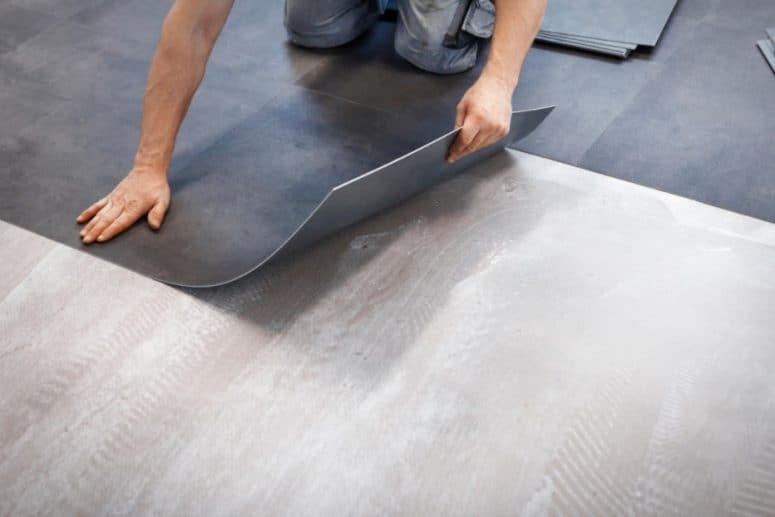
Tile vinyl flooring is slightly thinner, typically measuring 1/16 inches thick and cut into square shapes.
Installation involves placing each tile individually, either using peel-and-stick adhesive or glue. The tile vinyl flooring offers a wide range of patterns, similar to what you would find in ceramic tiles. So, you can rest assured that it will enhance the aesthetic appeal of your space.
In terms of texture, tile vinyl flooring feels similar to other types of vinyl. It is constructed using PVC material with fiberglass reinforcement, featuring a printed photograph covered with a transparent top coating.
One of the advantages of the tile type is its easy installation process. Moreover, since the tiles are installed individually, it becomes convenient to replace any damaged or broken tiles without affecting the entire floor. The precise square cuts of the tiles also facilitate easy removal and repair.
This type of vinyl flooring is particularly beginner-friendly. However, it’s worth noting that tile vinyl is not recommended for wet areas. While the surface is water-resistant, the small gaps between the tiles can allow water to seep into the underlying floor base.
Vinyl Sheet
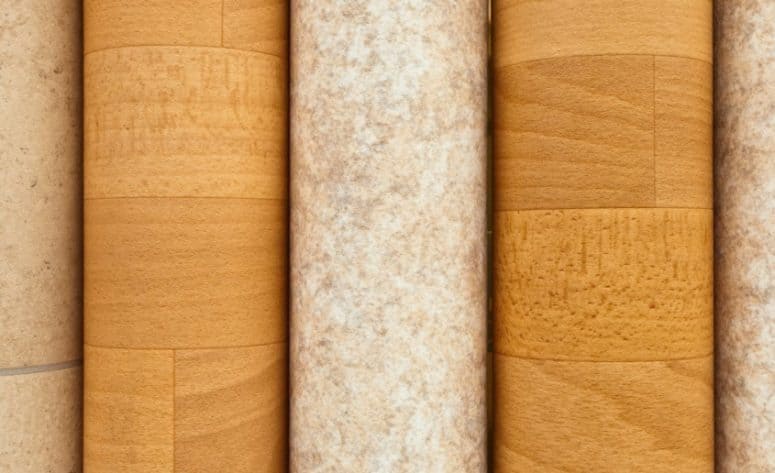
Sheet vinyl is available in lengths ranging from 6 to 12 feet, all rolled into one piece.
In terms of appearance, sheet vinyl can mimic various materials such as wood, stone, or any design that can be printed on its surface.
One notable advantage of sheet vinyl is its ability to minimize seams on the floor, making it highly resistant to water. This quality makes it suitable for areas prone to moisture, including laundry rooms and bathrooms.
However, it’s important to note that installing sheet vinyl can be challenging.
The process requires careful attention to detail, including proper gluing, precise measurement of the room, cutting the sheets accurately, and installing them onto the existing surface. This can be quite labor-intensive, which is why many people prefer to hire professionals for the job. For beginners, attempting a DIY installation of sheet vinyl could potentially lead to mistakes and unsatisfactory results.
On the bright side, maintenance and cleaning of sheet vinyl are relatively easy. There’s no need for special waxing, sealing, or other complicated treatments. Regular cleaning routines are typically sufficient to keep the sheet vinyl flooring in good condition.
LVT (Luxury Vinyl Tile)
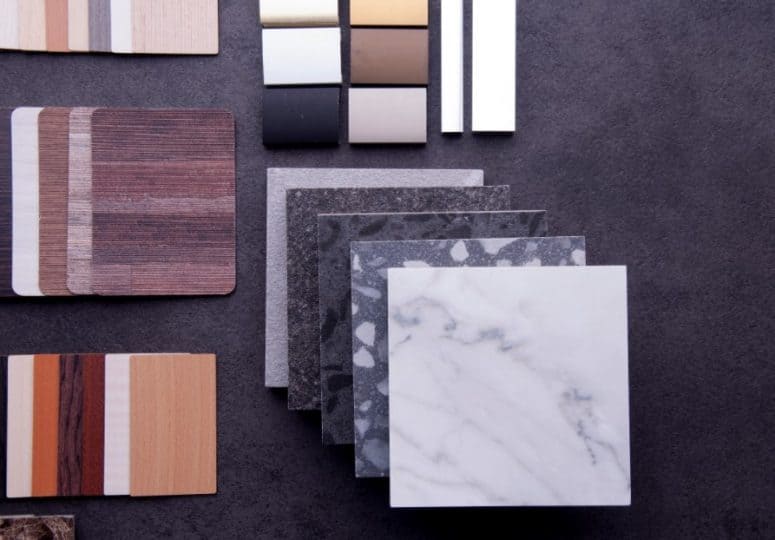
Constructed with multiple layers of PVC, LVT features a printed design on its surface, coated with a wear layer for added protection. What sets LVT apart is its additional reinforced polyurethane (PUR) finish, providing extra durability and treatment for the floor.
LVT is available in the form of flexible planks or tiles, offering versatility in design and installation options.
Aside from its protective layer, LVT stands out for its unique texture when walking on the floor. It is thinner than traditional vinyl planks but offers a softer and warmer sensation underfoot. Personally, I find the softness of LVT quite appealing.
When it comes to appearance, durability, and versatility, LVT ticks all the boxes. Maintenance is also a breeze.
Thanks to the polyurethane top layer, LVT is waterproof and highly resistant to moisture, stains, and scratches. It even withstands the pressure of sharp objects like high heels without leaving noticeable marks. As a result, the lifespan of LVT is remarkably long.
For installation convenience, LVT typically features a peel-and-stick backing, making it suitable for DIY enthusiasts or beginners.
Today, LVT is commonly used in luxurious homes and offices, as it offers both aesthetic appeal and practicality.
VCT (Vinyl Composition Tile)
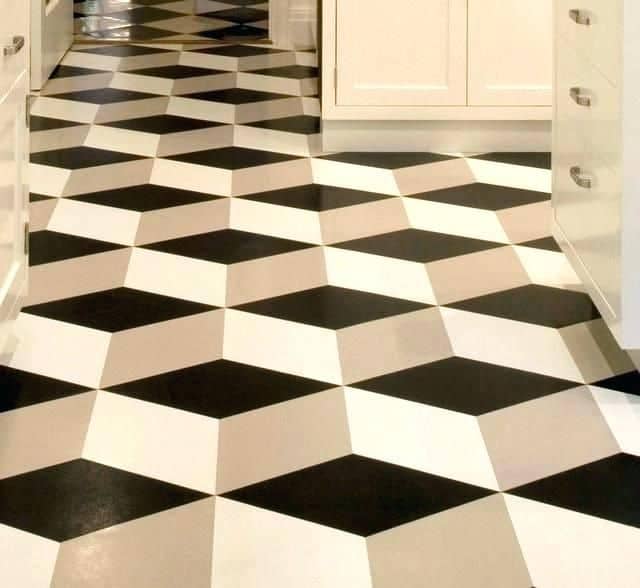
VCT comes in tile form, boasting a diverse selection of colors, gradients, and patterns. When I say diverse, I mean there’s an extensive range to choose from.
This type of vinyl flooring is widely used in commercial spaces like malls and department stores due to its ability to withstand high foot traffic. It offers exceptional durability, making it ideal for busy environments.
VCT is also highly resistant to UV sunlight, maintaining its stability and color for years. In fact, it can remain stain-free for up to 20 years, providing long-term benefits.
One of the advantages of VCT is its ability to absorb noise. If you’ve ever walked on a hard surface and experienced a lot of noise, VCT helps to reduce that impact and minimize the sound. It’s no wonder why many shopping places opt for VCT.
However, there are a few considerations to keep in mind. As you may have noticed in galleries showcasing vinyl composition tile, these 12×12 square-cut tiles have a glossy appearance.
While this adds to their visual appeal, it also means that the floor can become slippery when liquid is present. This can pose a safety hazard in certain situations.
Additionally, while regular maintenance for VCT is relatively straightforward, there are certain tasks that require more effort. For example, the floor needs to be recoated every six months, and proper maintenance includes coating the limestone, the primary material of VCT.
Failure to maintain the floor properly can lead to cracking, particularly in low-temperature conditions.
Woven Vinyl
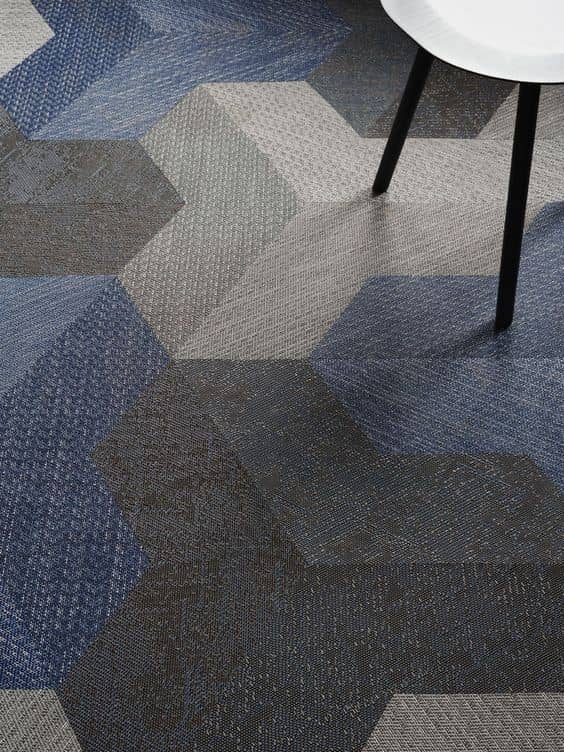
Woven vinyl flooring is commonly used in areas with high foot traffic, such as offices or children’s rooms. The material used in woven vinyl allows it to have minimal water absorption compared to other vinyl flooring options.
This feature makes it waterproof on both the top and back surfaces, enhancing its durability, quick-drying nature, and ease of maintenance.
Another benefit of woven vinyl is its comfortable feel underfoot and its antimicrobial properties. These qualities contribute to a flooring surface that is less prone to allergens and mold.
Now, let’s discuss the installation process.
Different individuals may have their own methods of installing woven vinyl flooring. However, a common aspect is the use of fasteners or glue to secure the flooring and ensure a unified appearance.
Woven vinyl is often utilized as a mat or runner in homes or in areas prone to moisture, like laundry rooms or garden entrances.
When installing woven vinyl flooring, it’s essential to use recommended brands for fasteners and exercise caution while applying glue to ensure proper placement.
Vinyl Flooring Wear Layer Options
The world of vinyl flooring offers a diverse range of designs, but it’s important to note the differences in their wear layers or coatings.
There are three types of surface coatings, each present in different vinyl flooring options to protect the floor from dirt, stains, and unsightly marks.
- Vinyl No-Wax: This coating provides a glossy and shiny appearance without the need for regular polishing. It has the lowest tolerance for dirt, making it suitable for rooms with light traffic.
- Urethane: Urethane is the coating of choice for rooms with average to heavy foot traffic. It is scratch-resistant and can handle some scuff marks, while also being easy to clean.
- Enhanced Urethane: Regarded as the highest quality wear layer in vinyl flooring, enhanced urethane can withstand heavy traffic and effectively handle significant stains and scratches. Moreover, this coating maintains its original luster better than other coatings.
By understanding the characteristics of each coating, you can select the appropriate vinyl flooring option that aligns with your specific needs and the level of foot traffic in the room.
What’s The Best Vinyl Flooring?
Are you still uncertain about which type of vinyl flooring to choose for your rooms? Let’s take a closer look at each option to help you make an informed decision.
The Best Vinyl Flooring Overall
When it comes to durability and versatility, LVT stands out as the top choice. It is a highly resilient flooring option that can be installed in any room throughout your home.
Not only is LVT water-resistant, but it also offers excellent scratch resistance and can withstand varying temperatures and sharp objects without damage.
The Best Vinyl Flooring for Small Rooms
When it comes to vinyl tiles, there are various sizes available to choose from. For narrow rooms, opting for larger sizes like 16, 18, or 24 inches can be a great alternative to the standard size. This can help create an illusion of more space and make the room appear less cramped.
Another option is to consider sheet vinyl, which allows you to purchase flooring that is precisely measured to fit your room. This can be beneficial in terms of minimizing waste and ensuring optimal utilization of the material.
If you’re aiming to make your room look wider, selecting a bright color for your vinyl flooring is an excellent choice. Bright colors tend to create an open and airy feel, giving the illusion of a more expansive space.
The Best Vinyl Flooring for Wet Areas
Vinyl flooring is highly advantageous due to its water-resistant and scratch-resistant properties. However, when it comes to installing in wet areas, sheet vinyl and LVT are the ideal choices.
Sheet vinyl is particularly beneficial as it provides a seamless installation, minimizing the presence of seams where water could potentially penetrate and cause warping. Its virtually seamless nature ensures maximum protection against moisture.
LVT, on the other hand, offers similar benefits while also providing enhanced aesthetics and a wide range of design options. With LVT, you can achieve both functionality and a visually appealing flooring solution. Both sheet vinyl and LVT are excellent options for bathrooms and laundry rooms, where water exposure is more likely.
The Most Durable Vinyl Flooring
Vinyl flooring, in general, offers remarkable durability, making it a reliable choice for various rooms. However, the specific type of vinyl flooring you choose should depend on your personal preference and the requirements of the room you intend to decorate.
Each type of vinyl flooring has its own unique charm and suitability. It’s important to consider the style and design elements that align with your vision, as all vinyl flooring types boast excellent durability. By carefully assessing your needs and considering the desired aesthetics, you can select the perfect vinyl flooring option for your space.
What’s The Difference Between Vinyl & Laminate?
While vinyl flooring is primarily composed of synthetic materials, laminate flooring is crafted using real wood. This distinction makes laminate flooring more susceptible to moisture damage compared to vinyl.
One notable advantage of laminate flooring is its ability to closely replicate the texture and appearance of real hardwood. It achieves this through a composition that includes a wood fiberboard core with a printed image of wood grain, which is then sealed beneath a transparent protective layer.
To create a sturdy and authentic flooring material, all these layers are laminated together. Laminate flooring is typically available in plank form, closely mimicking the look and feel of traditional hardwood floors.
What’s The Difference Between Vinyl & Linoleum?
In contrast to vinyl flooring, linoleum is a flooring option that is entirely made from natural materials. This eco-friendly aspect is one of its main distinguishing features. Despite being environmentally friendly, linoleum remains affordable and offers good durability.
However, due to its natural composition, linoleum is not as water-resistant as vinyl flooring. In terms of maintenance, vinyl flooring is easier to clean with simple sweeping or mopping.
On the other hand, linoleum requires an annual protective coating and waxing to maintain its longevity. While this requires more effort compared to vinyl, it contributes to its extended lifespan. Linoleum is generally slightly more expensive than vinyl and is commonly used in commercial spaces.
Vinyl Flooring Maintenance
Vinyl flooring possesses a natural shine and does not require additional polish or wax for its maintenance. Certain types of vinyl flooring even have a wear layer that provides protection against stains and tough substances like permanent markers.
To ensure the durability and strength of your vinyl flooring, it is essential to follow these guidelines:
- Regularly sweep, dust, damp mop, or vacuum the floor to prevent scratches and debris buildup.
- Use a pH-neutral floor cleaner that does not contain wax, oil, or polish. Refer to the product’s use and care guide for specific instructions.
- Immediately clean up any standing water, pet urine, or spills, even if the vinyl flooring is water-resistant.
- Avoid using steam cleaners or vacuums with beater bars, as they may damage the floor.
- Place flat floor protectors, such as nylon or felt pads, under furniture legs to prevent scratches and dents.
- Keep your pets’ nails trimmed to prevent them from scratching the vinyl surface.
By following these maintenance practices, you can ensure that your vinyl flooring remains in excellent condition and maintains its durability over time.